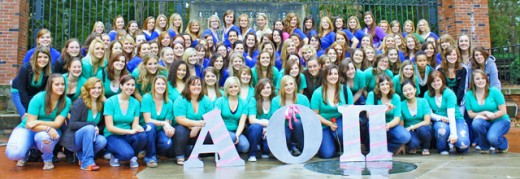Sororities--Everything You Need to Know: Part 1

Part 1—Overview and History of Sororities
Sorority recruitment and membership is a much-anticipated rite of passage for many college-aged women. Whether they are legacies—daughters, granddaughters, or sisters of sorority members--who’ve grown up hearing stories of their family members’ experiences, or girls with no prior connection to the Greek system who are interested in the academic, philanthropic, and social aspects of a sorority, the numbers of young women registering for Panhellenic recruitment are rising every year.
What is a sorority, exactly? How and where did they start, and how did they evolve from their original incarnations as small, academic “secret societies” into the large, non-profit organizations we see today? How and why has public perception of these groups changed over the years? What do these groups offer their membership, their campuses, and their communities? How does one go about joining a sorority, and what can one expect during the recruitment process?
In this six-part series, I’ll discuss the answers to these questions and much more. We’ll start with an overview and history of Greek-letter sororities in America and look at the evolution of these groups into the influential campus organizations of today. Next, we’ll talk about the pros and cons of sorority membership. Part 4 of the series will go over the recruitment process from registration to requirements, and Part 5 will look at the actual recruitment parties and how best to navigate what can be an overwhelming experience. We’ll finish up with a discussion of how to decide which sorority is The One—or whether any of them are right for you at all.
A Brief History of Sororities
On most college campuses, there are several Greek-letter organizations with different memberships, mission statements, and purposes. There are social fraternities and sororities, cultural organizations, professional groups, service organizations, and honor societies—and it’s possible to be a member of several of these groups. For the purposes of this series, we’ll be talking about the twenty-six sororities represented by the National Panhellenic Conference, the oldest and largest representative conference of women’s Greek-letter social sororities.
Secret societies originated on college campuses in the earliest days of the nation, out of the desire to discuss and debate subjects thought to be inappropriate by faculty members. The first women’s “secret society” was founded in 1851 at Wesleyan Female College in Macon, Georgia. The Adelphean Society (later Alpha Delta Pi) was started “for the mental, moral, social, and domestic improvement of its members”, sharing with later, similar groups the burden of proving that women could hold their own in the academic and intellectual arena while still upholding the high ideals of Victorian womanhood. By setting academic standards and providing a safe, supportive framework for social activities, these early societies ensured that female students could and would meet the same rigorous challenges as their male counterparts.
The Adelphean Society stood alone until 1867, when I.C. Sorosis was founded at Monmouth College in Illinois. This group later became known by its motto, Pi Beta Phi—but not before Kappa Alpha Theta was founded as the first Greek-letter women’s fraternity in continued existence at DePauw University in 1870. Later, Gamma Phi Beta (founded in 1874 at Syracuse University) became the first group known as a sorority, after its male faculty advisor coined the term in 1882.
Several other Greek-letter women’s groups were founded during this time, and while some campuses’ sororities formed unofficial agreements regarding “rushing” (recruitment) and pledging (the pre-initiation period for new members), attempts to create a unified organization for the purpose of establishing standards were unsuccessful. Not until 1902 did Alpha Phi succeed in hosting a gathering of representatives from seven sororities in Chicago, whereupon the National Panhellenic Conference (NPC) was founded. The conference quickly expanded to include more sororities, and now represents twenty-six sororities with chapters on over 620 college and university campuses, as well as over 4,600 alumnae chapters.
National Panhellenic Conference Logo

National Panhellenic Conference
NPC has overseen many unanimous agreements amongst its membership, from standards regulating recruitment processes and rules to educational campaigns to inform members about the dangers of hazing, substance abuse, and date rape. In addition, NPC chapters across the country provide numerous scholarships and leadership training opportunities to collegiate sorority members. Perhaps most importantly, NPC provides regional recruitment advisors to assist both collegiate and alumnae Panhellenic organizations in their recruitment endeavors.
- National Panhellenic Conference
NPC is comprised of twenty-six sorority organizations and provides a unifying framework through which standards, rules, and general guidelines are agreed upon by its member sororities.
- The Sorority Life
NPC's website for potential new sorority members. Get the scoop on what sorority life is really like. Real college women, just like you, share experiences and reveal common misconceptions.
Sororities Today
The image of sororities has shifted through the years, from groups of educated young women seeking further academic stimulation and companionship in the earliest days, to wealthy children of privilege associating with their own exclusive groups in the early and mid-20th century; from out-of-touch, establishment pawns in the 1960s to diverse, socially aware young leaders of today.While some chapters at some schools still reflect the predominantly white Christian membership of the past, NPC sororities overall have diversified their memberships to include all races and faiths, and NPC recruitment policies have changed over the years to discourage exclusivity and make joining a sorority not just a possibility but a reality for as many outstanding young women as possible.
The national (and in some cases, international) organizations of each group have expanded to oversee their collegiate and alumnae chapters and coordinate million-dollar philanthropic efforts on behalf of their sororities.Most groups now have a designated charity organization or philanthropic endeavor supported by collegiate and alumnae chapters, and many local chapters also have a community philanthropy as well.There is no way of knowing how many millions of dollars these groups have raised for their chosen charities, but both NPC and the national offices of each sorority work tirelessly to continue these efforts each year.
Today’s sororities are made up of campus leaders, outstanding academic achievers, and talented young women who learn valuable organizational and leadership skills in a safe, supportive environment during their collegiate chapter experience.There are, though, individuals and sometimes entire chapters whose behavior reflects poorly on the sorority community in general, providing fodder for the media and fostering popular stereotypes in the entertainment industry.In Parts 2 and 3 of this series, we’ll take a look at the positive and negative aspects of sorority life, and how to decide whether joining a sorority is right for you.
- Sororities--Everything You Need to Know: Part 2
Part 2 of a six-part series on sorority recruitment and membership focuses on the pros and cons of joining a sorority - Sororities--Everything You Need to Know: Part 3
Part 3 of a six-part series continues the discussion of points to consider when thinking about sorority recruitment - Sororities--Everything You Need to Know: Part 4
Part 4 in a series outlines the steps to take when preparing for sorority recruitment registration - Sororities--Everything You Need to Know: Part 5
In Part 5 of a series, we look at ways to organize and prepare for sorority recruitment week - Sororities--Everything You Need to Know: Part 6
Part 6 of a series on sorority recruitment and membership, focusing on what to expect during Recruitment Week - The Sorority Recruitment Cheat Sheet--Top Tips for Sorority Success
Here’s a cheat sheet to take you all the way through the process of joining a sorority.






